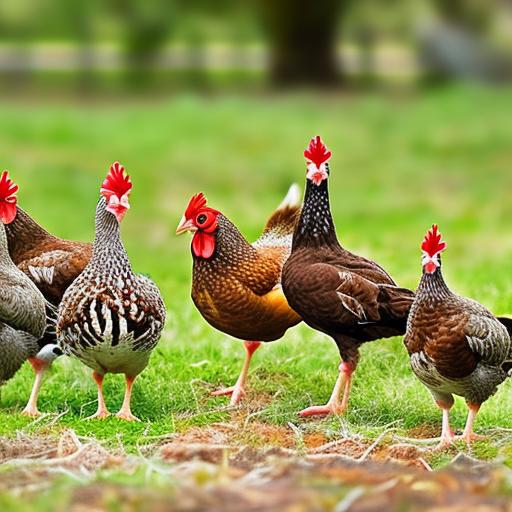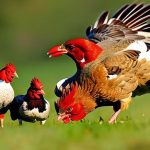Raising free range chickens can be a rewarding and fulfilling experience. Not only do these chickens have the freedom to roam and forage, but they also provide fresh eggs and meat. However, it’s important to understand the risks involved in raising free range chickens and take necessary precautions to ensure their safety and well-being.
Key Takeaways
- Free range chickens face risks from predators and pests
- Secure coops and fencing are important for protecting chickens
- Choosing the right breeds for your environment can improve survival rates
- Adequate food and water sources are necessary for healthy chickens
- Protecting against predators and pests is crucial for chicken safety
Understanding the Risks to Free Range Chickens
Free range chickens face various risks, including predators and diseases. Predators such as foxes, raccoons, and hawks can pose a threat to the safety of your chickens. These predators are attracted to the presence of chickens and can easily snatch them away if they are not properly protected. In addition, diseases such as avian influenza and Newcastle disease can spread quickly among free range chickens if proper biosecurity measures are not in place.
It’s crucial for chicken owners to be aware of these risks and take steps to mitigate them. By understanding the potential dangers, you can implement strategies to protect your flock and ensure their safety.
The Importance of Secure Coops and Fencing
One of the most important aspects of protecting free range chickens is having secure coops and fencing. A secure coop provides a safe space for your chickens to roost at night, protecting them from predators that are more active during the dark hours. The coop should be made of sturdy materials and have a solid roof to prevent any unwanted entry.
Fencing is equally important in keeping predators out and chickens safe. The fence should be tall enough to prevent predators from jumping over it, and the gaps between the wires should be small enough to prevent predators from squeezing through. Regularly inspecting the coop and fencing for any signs of wear or damage is essential to ensure their effectiveness.
Choosing the Right Breeds for Your Environment
| Breed | Environment | Size | Temperament | Exercise Needs | Grooming Needs |
|---|---|---|---|---|---|
| Labrador Retriever | Suburban or rural | Large | Friendly, outgoing | High | Medium |
| Chihuahua | Urban or apartment | Small | Alert, lively | Low | Low |
| German Shepherd | Rural or suburban | Large | Loyal, protective | High | High |
| Bulldog | Urban or suburban | Medium | Calm, friendly | Low | Low |
| Greyhound | Rural or suburban | Large | Gentle, independent | Medium | Low |
When raising free range chickens, it’s important to choose breeds that are well-suited to your climate and environment. Some breeds are more tolerant of extreme temperatures, while others are better at foraging for food. By selecting the right breeds, you can ensure that your chickens thrive in their surroundings.
For example, if you live in a cold climate, breeds such as the Rhode Island Red or the Plymouth Rock are known for their cold-hardiness. On the other hand, if you live in a hot and humid environment, breeds like the Leghorn or the Sussex may be more suitable. Researching and understanding the specific needs of different breeds will help you make an informed decision.
Providing Adequate Food and Water Sources
Providing adequate food and water is essential for the health and well-being of free range chickens. Chickens need a balanced diet that includes grains, vegetables, and protein sources. They also require access to fresh water at all times.
To ensure that your chickens have enough food, consider supplementing their diet with commercial chicken feed. This will provide them with the necessary nutrients they need to stay healthy. Additionally, make sure to provide a variety of foraging opportunities, such as scattering food in different areas of their range.
Protecting Against Predators and Pests

Predators and pests can pose a significant threat to free range chickens. It’s important to take steps to protect your flock from these potential dangers. One effective method is to use deterrents such as motion-activated lights or noise devices to scare away predators.
Another option is to set up traps or snares to catch predators that may be lurking around your property. However, it’s important to check local regulations before using any trapping methods to ensure that you are in compliance with the law.
Regular Health Checks and Preventative Measures
Regular health checks and preventative measures are crucial for keeping free range chickens healthy. This includes monitoring their overall condition, checking for signs of illness or injury, and administering vaccinations or treatments as needed.
It’s also important to implement preventative measures to minimize the risk of diseases spreading among your flock. This can include quarantining new birds before introducing them to the rest of the flock, practicing good hygiene, and regularly cleaning and disinfecting the coop and surrounding areas.
Implementing Biosecurity Protocols
Implementing biosecurity protocols is essential for preventing the spread of diseases among free range chickens. This involves taking steps to minimize the risk of introducing pathogens onto your property and preventing their spread within your flock.
Some biosecurity measures you can implement include limiting access to your property, practicing good hygiene, and regularly disinfecting equipment and tools. It’s also important to be aware of any disease outbreaks in your area and take appropriate precautions to protect your flock.
Managing Your Flock’s Social Dynamics
Managing your flock’s social dynamics is important for preventing aggression and ensuring a healthy flock. Chickens have a pecking order, and it’s important to monitor their behavior to prevent bullying or fighting.
Providing enough space for your chickens to roam and establishing multiple feeding and watering stations can help reduce competition and aggression. Additionally, introducing new birds gradually and monitoring their interactions can help prevent conflicts within the flock.
Keeping Your Property Safe from Trespassers
Keeping your property safe from trespassers is crucial for protecting your free range chickens. Trespassers may harm or steal your chickens, so it’s important to take steps to secure your property.
Installing security cameras or motion-activated lights can help deter trespassers. Additionally, posting signs indicating that the property is monitored or protected can act as a deterrent. Regularly inspecting fences and gates for any signs of damage or weakness is also important to ensure that your property remains secure.
Planning for Emergencies and Natural Disasters
Having a plan in place for emergencies and natural disasters is essential when raising free range chickens. This includes having a designated shelter area for your chickens in case of severe weather or other emergencies.
It’s also important to have a stockpile of food and water that can sustain your flock for an extended period of time. Additionally, having a communication plan in place with neighbors or local authorities can help ensure that you receive timely information and assistance during emergencies.
Raising free range chickens can be a rewarding experience, but it’s important to understand the risks involved and take necessary precautions to protect your flock. By providing secure coops and fencing, choosing the right breeds, providing adequate food and water, protecting against predators and pests, conducting regular health checks, implementing biosecurity protocols, managing social dynamics, securing your property, and planning for emergencies, you can ensure the safety and well-being of your free range chickens.
If you’re looking for ways to keep your free-range chickens safe, you might want to consider investing in a secure chicken coop. The Snaplock Chicken Coop from Poultry Wizard is a great option that provides both safety and convenience. With its snap-together design, this coop is easy to assemble and disassemble, making it perfect for those who need a portable solution. It also features sturdy construction and predator-proof latches, ensuring that your chickens are protected from any potential threats. Check out the Snaplock Chicken Coop here to learn more about how it can help keep your free-range chickens safe.
FAQs
Meet Walter, the feathered-friend fanatic of Florida! Nestled in the sunshine state, Walter struts through life with his feathered companions, clucking his way to happiness. With a coop that’s fancier than a five-star hotel, he’s the Don Juan of the chicken world. When he’s not teaching his hens to do the cha-cha, you’ll find him in a heated debate with his prized rooster, Sir Clucks-a-Lot. Walter’s poultry passion is no yolk; he’s the sunny-side-up guy you never knew you needed in your flock of friends!







